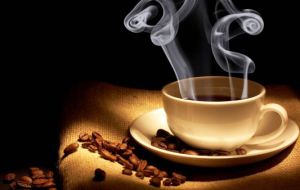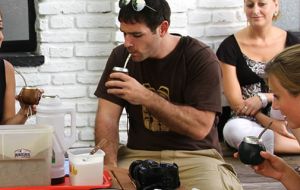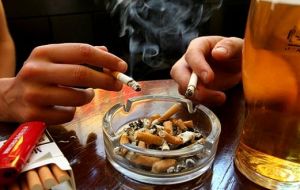MercoPress. South Atlantic News Agency
Mate and coffee fine to drink as long as they are not hot beverages, says WHO cancer agency
 The experts did find that drinking very hot beverages probably causes cancer of the oesophagus in humans.
The experts did find that drinking very hot beverages probably causes cancer of the oesophagus in humans.  No conclusive evidence was found for drinking mate at temperatures that are not very hot.
No conclusive evidence was found for drinking mate at temperatures that are not very hot.  Results suggest that hot beverages is one probable cause of oesophageal cancer, temperature, rather than the drinks themselves”, says IARC Dr Christopher Wild
Results suggest that hot beverages is one probable cause of oesophageal cancer, temperature, rather than the drinks themselves”, says IARC Dr Christopher Wild  Studies in South America, where tea or mate is traditionally drunk very hot (70 °C), found that the risk of oesophageal cancer increased with the temperature
Studies in South America, where tea or mate is traditionally drunk very hot (70 °C), found that the risk of oesophageal cancer increased with the temperature  ”But smoking and alcohol drinking are major causes of esophageal cancer, particularly in many high-income countries,” stresses Dr Wild.
”But smoking and alcohol drinking are major causes of esophageal cancer, particularly in many high-income countries,” stresses Dr Wild. An international Working Group of 23 scientists convened by the International Agency for Research on Cancer (IARC), the cancer agency of the World Health Organization (WHO), has evaluated the carcinogenicity of drinking coffee, mate, and very hot beverages.
A summary of the final evaluations is published in The Lancet Oncology, and the detailed assessments will be published as Volume 116 of the IARC Monographs.
The Working Group found no conclusive evidence for a carcinogenic effect of drinking coffee. However, the experts did find that drinking very hot beverages probably causes cancer of the esophagus in humans. No conclusive evidence was found for drinking mate at temperatures that are not very hot.
“These results suggest that drinking very hot beverages is one probable cause of oesophageal cancer and that it is the temperature, rather than the drinks themselves, that appears to be responsible,” says Dr Christopher Wild, IARC Director.
This was based on limited evidence from epidemiological studies that showed positive associations between cancer of the esophagus and drinking very hot beverages. Studies in places such as China, the Islamic Republic of Iran, Turkey, and South America, where tea or mate is traditionally drunk very hot (at about 70 °C), found that the risk of oesophageal cancer increased with the temperature at which the beverage was drunk.
In experiments involving animals, there was also limited evidence for the carcinogenicity of very hot water.
”Smoking and alcohol drinking are major causes of esophageal cancer, particularly in many high-income countries,” stresses Dr Wild. “However the majority of oesophageal cancers occur in parts of Asia, South America, and East Africa, where regularly drinking very hot beverages is common and where the reasons for the high incidence of this cancer are not as well understood.”
Oesophageal cancer is the eighth most common cause of cancer worldwide and one of the main causes of cancer death, with approximately 400.000 deaths recorded in (5% of all cancer deaths). The proportion of oesophageal cancer cases that may be linked to drinking very hot beverages is not known.
Cold mate did not have carcinogenic effects in experiments on animals or in epidemiological studies. Therefore, drinking mate at temperatures that are not very hot was not classifiable as to its carcinogenicity to humans.
This was based on inadequate evidence in humans for the carcinogenicity of drinking cold or warm mate and inadequate evidence in experimental animals for the carcinogenicity of cold mat as a drinking liquid.
Drinking coffee was not classifiable as to its carcinogenicity to humans. The large body of evidence currently available led to the re-evaluation of the carcinogenicity of coffee drinking, previously classified as possibly carcinogenic to humans by IARC in 1991.
After thoroughly reviewing more than 1000 studies in humans and animals, the Working Group found that there was inadequate evidence for the carcinogenicity of coffee drinking overall.
Many epidemiological studies showed that coffee drinking had no carcinogenic effects for cancers of the pancreas, female breast, and prostate and reduced risks were seen for cancers of the liver and uterine endometrium.
For more than 20 other cancers, the evidence was inconclusive.
The IARC Monographs Program seeks to classify cancer hazards, meaning the potential of any substance to cause cancer based on current knowledge. The classification does not indicate what level of risk exists to people’s health associated with exposure to a classified hazard. For example, IARC has classified tobacco smoking as carcinogenic to humans, but that classification does not indicate the increase in risk for each cigarette smoked.




Top Comments
Disclaimer & comment rules-

-

-

Read all commentsnot hot beverages,
Jun 19th, 2016 - 07:06 pm 0so that's cold tea than people,
so far, it seems no matter what we all do or eat drink ,
we will end up getting the big C,
What are we supposed to do..
Grin & bear it?
Jun 20th, 2016 - 12:08 pm 0l'm not giving up my hot morning coffee for anyone.
Starting to like tea in the afternoons, now.
Vodka or wine in the evenings.
Choke on that, big C.
Regards, Briton.
Very hot beverages not hot beverages.
Jun 20th, 2016 - 01:52 pm 0Commenting for this story is now closed.
If you have a Facebook account, become a fan and comment on our Facebook Page!